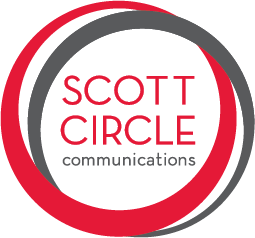What I Wish I Knew About A Career in Communications
Graduation marks the successful completion of studies. Receiving one’s diploma is akin to being initiated into the club of adulthood. After years of exams, papers and projects, most graduates feel as if they know everything necessary to enter the workforce. However, the transition from education to career can bring the fear of the unknown. At Scott Circle Communications, we discussed what we wished we knew when entering the workforce – specifically, what we wish we knew before beginning our careers in communications and public relations. Here are some tips our team has to share:
Laura Gross: Follow your passion.
When you are doing PR, you are living and breathing what you are doing all the time and others must see your passion for the work too. In order to be successful, it helps to be “all in” on what you are working on. If you love clothes, maybe fashion PR is for you. If cooking is something you love, working to promote a restaurant or a food brand might be ideal for you. Of course, there will be plenty of times you will need to work on something that is just a “meh” project or something you can’t 100% get behind – after all, no job is going to be perfect.
Kellie Murphy: Walk in other people’s shoes.
A range of experiences in different communications environments gives you a broader perspective that can make you a better counselor and client. Having worked both in-house and at agencies during my career, I feel like I am able to see things from my client or consultant’s point of view, depending on where I’m sitting. My experience as a consultant made me a better client because I had an understanding of the process from their side of the table and was able to articulate my goals and needs more clearly and keep my expectations realistic. Having hired and managed consultants in the past makes me sensitive to the internal pressures and demands that my clients face, which allows me to anticipate their needs and questions and set them up for success.
Dee Donavanik: Consume information – and lots of it!
The more you read different types of media, the more media knowledge you have when it comes time to try and get a client placed somewhere. You’ll already know the format of articles, or the topics that interest a reporter... so when you reach out to them, you know that what you’re offering is on point and you’re not wasting your time. A reporter/producer can tell if you haven’t done your homework or bothered to look at their previous work!
Daniella Burgos: Be flexible.
In communications and PR, flexibility is critical, and you must be able to pivot at a moment’s notice because clients can change their plans or specific resources might not be available to complete certain tasks. You need to have the ability to handle whatever comes your way, expect the unexpected, and keep coming up with different solutions to a problem.
Lauren Farber: Tend to your creativity.
When your work challenges you to write from different points of view, or to stay ahead of news in a demanding industry or subject area, it’s easy to feel completely creatively wrung out. You’ll need to summon your inner resources to push through, and that means carving out space for thinking about or doing something other than the problem you’re trying to solve. No one is an infinite fountain of good ideas. You need to work your other muscles to be a stronger creative thinker.
Elizabeth Harmon: Get ready to research.
Research is a driving force of so many aspects of PR and communications. From media relations to messaging to new business, having strong research skills will help you grow in your career. You may research supporting evidence for your media pitch and create the perfect media list or look into new ideas for a new business brainstorm. Having an understanding of research processes to better understand your audience or messaging tactics is also something you want to keep on your radar.
Matheson Sharp: Everyone is learning, all the time!
There are webinars, workshops, tutorials, podcasts, books, magazines...name the medium and there is a way to learn about communications and PR. Understanding that the industry is constantly evolving, and trends and tastes are changing, is critical to staying in touch and keeping up with the times. It is never too late to develop a new skill or polish an old one, and by keeping an eye out for new opportunities you will be prepared for what comes next.
Dani Townsend: Be open!
Be open to learning new things, to learning new ways of doing things. And most importantly, be open to asking questions and be open to asking for help and suggestions. Don’t take for granted what others can contribute to your growth. It takes a village. And that applies to all facets of professional development.
No matter the course graduates take after walking across that stage, they should feel proud to have reached this milestone. Even if you are not interested in communications, certain tips ring true across all fields: tend to your passions, nurture your creativity and never stop learning. You’ll go far.
